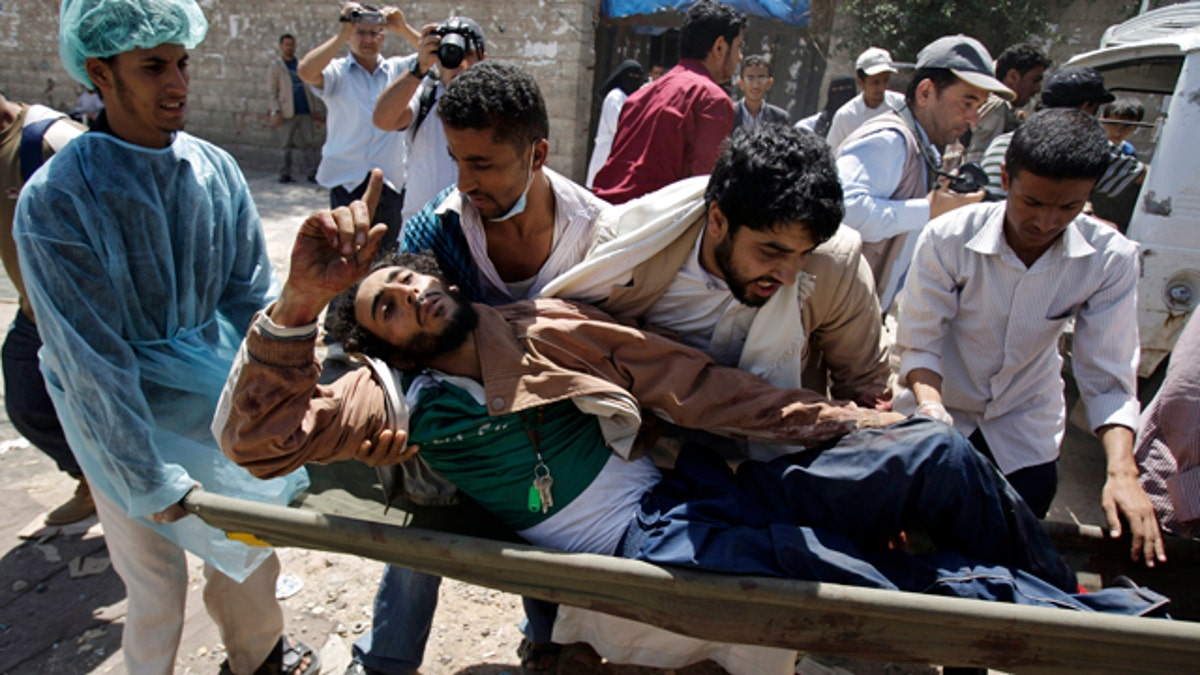
Sept. 20: Yemeni anti-government protestors carry an injured protestor from the site of clashes with security forces in Sanaa. (AP)
SANAA, Yemen – Rapidly escalating street battles between opponents of Yemen's regime and forces loyal to its embattled president spread to the home districts of senior government figures and other highly sensitive areas of the capital on Tuesday. A third day of fighting, including a mortar attack on unarmed protesters, killed nine people, medical officials said.
The latest deaths took to at least 60 the number of people killed since Sunday, as anti-regime protesters step up their campaign to topple President Ali Abdullah Saleh and a key military unit supporting them is drawn deeper into the fighting. Saleh's forces have hit back with attacks by rooftop snipers and shelling of protest encampments.
In Geneva, the United Nations said Tuesday that four children were killed by live ammunition during the unrest on Sunday and Monday. Marixie Mercado, a spokeswoman for the U.N. children's' fund, also said that 18 minors were injured.
Mercado told reporters in Geneva that the casualties were confirmed by UNICEF's local partners in Yemen.
Yemen's turmoil began in February as the unrest spreading throughout the Arab world set off largely peaceful protests in the deeply impoverished and unstable corner of the Arabian Peninsula that is also home to an al-Qaida offshoot blamed for several nearly successful attempts to attack the United States.
The government has responded with a heavy crackdown.
President Saleh went to Saudi Arabia for medical treatment after a June attack on his Sanaa compound and has not returned to Yemen, but has resisted calls to resign.
After the dawn Muslim prayer on Tuesday, Saleh's forces lobbed mortar shells at Change Square, a plaza at the heart of the city where protesters have held a sit-in since the uprising began in February.
Medical officials said the shelling killed three protesters, three rebel soldiers and a bystander.
Clashes between protesters and security forces in the southern city of Taiz left two more people dead, they said. The officials spoke on condition of anonymity because they were not authorized to share the information.
Elsewhere in the capital, clashes between protesters and security forces erupted in several districts, with gunfire ringing out in areas close to Saleh's residence and the office of his son and one-time heir apparent, Ahmed, commander of the elite loyalist Republican Guards and Special Forces.
In the upscale district of Hadah, home to senior government officials as well as tribal leaders opposed to Saleh, gunbattles were raging between forces loyal to the president's son and bands of tribal fighters opposed to the regime.
The violence is forcing more of the capital's residents to flee to the relative safety of rural Yemen.
Scores of pickup trucks and sedans loaded with families and personal belongings could be seen headed out in early Tuesday morning after a night in which loud explosions repeatedly shook the city.
Most of those staying put in the capital are not leaving their homes for fear of snipers or getting caught up in gunfights, leaving the city looking increasingly deserted on Tuesday morning, with most stores shuttered.
